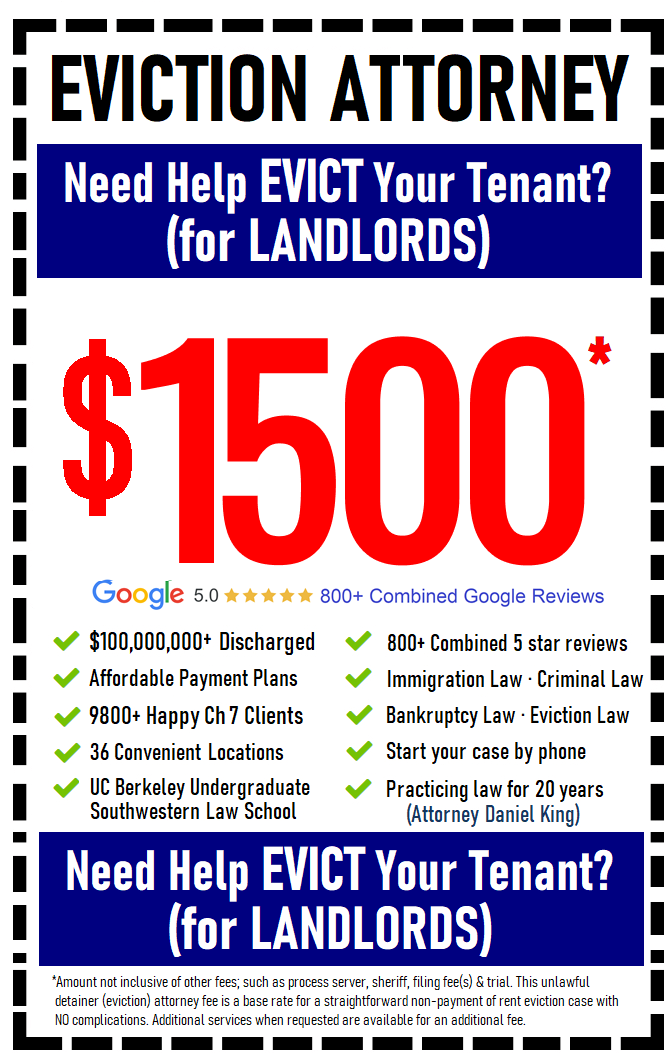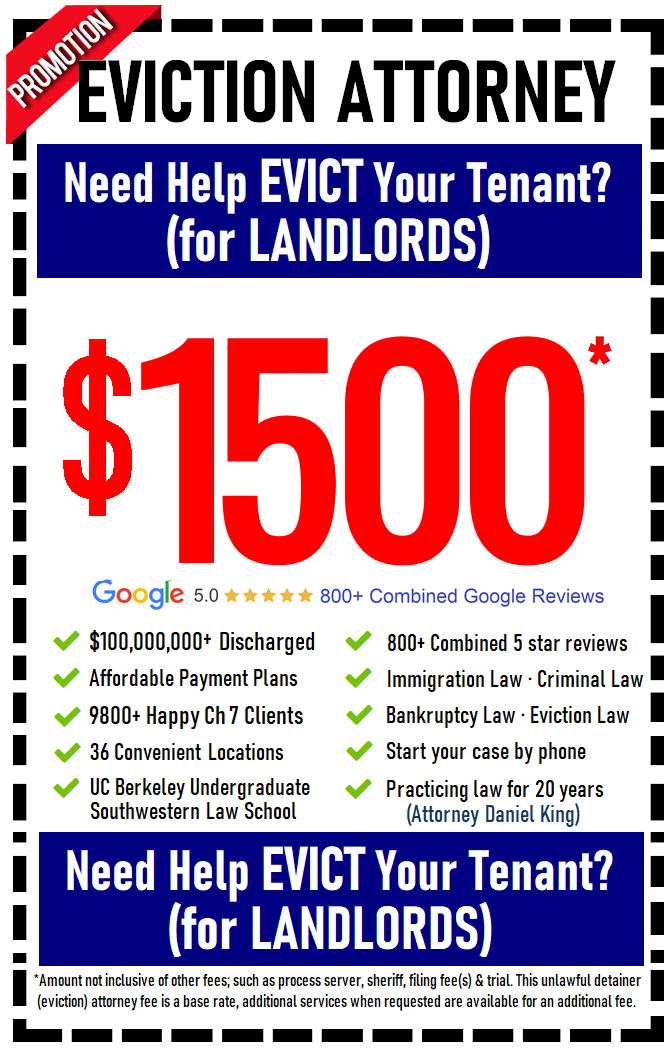|
Eviction Attorney for Landlords. Evict your tenant today. Landlords are often the backbone for housing in many areas of the country including California where housing prices are out of range for many people and who look to rent houses, apartments, and rooms. As in all states, tenants have certain rights that protect them from discriminatory and predatory practices by unethical property owners, but landlords and property owners have rights as well. UD - Unlawful Detainer Lawyer 
Toll Free 1(888)
759-1274
Available 7 Days a Week 7am to 9pm 36 LOCATIONS IN CALIFORNIA 
At the Eviction Attorney Group, we help landlords understand their rights when it comes to their tenants and what legal procedures they are required to follow if they must evict unruly tenants, those who damage the property, engage in unlawful activities, or simply fail to pay their rent. When Can a Landlord Evict a Tenant? As a landlord, you hopefully have a lease signed by all parties that outlines the terms of the rental agreement including the term of the tenancy, rent to be paid, date of payment, the identity of the tenants, where or how to pay the rent, what activities are prohibited, etc. Your lease agreement should also indicate that if certain banned activities are practiced by the tenant, that these constitute a material breach of the agreement and that you have the right to begin eviction proceedings against them. Examples of reasons or activities for which you can evict a tenant include:
As a landlord, you cannot take individual action to oust or evict a tenant without following the necessary procedures to do so. You cannot change the locks on the unit’s doors, turn off utilities, or enter the unit to remove a tenant’s personal belongings. If you take such action, you can be subject to civil damages and possible criminal consequences. Rental laws are generally designed to protect tenants who can use the court process to oppose any attempt to evict them if you engage in discriminatory acts or fail to follow the proper procedures.
TYPE OF EVICTION NOTICE(S) 3-Day Notice Pay Rent or Quit: Failure to pay rent 3-Day Notice to Vacate: Damage to the property 3-Day Notice to Cure or Quit: Violating terms of the agreement - Remaining on the property after the lease is up 3-Day Notice to Vacate: Illegal uses of the property including drug use, production, or sales. Being a nuisance to other tenants 5-Day Notice to Vacate: Forcible Entry 3/90-Day Notice to Quit: Previous Owner Holdover Squatters in your property 30-Day Notice 60-Day Notice If you follow the required procedures and have adequate cause to evict a tenant if required, you should prevail in court. In order to ensure that all proper procedures have been followed and to respond to tenants who may argue that their rights were violated, contact and retain an attorney from the Riverside Eviction Attorney Group. |

20
Years Experience
9,800+
Happy Ch 7 Clients
EVICTION
Bankruptcy . Criminal
36 Locations
In California
800+ 5 Stars
Combined Reviews
PHONE
Start your case by phone
$100 Million
Discharged
Daniel J King, Esq.
Managing Attorney/Owner
UC BERKELEY
Undergraduate
SOUTHWESTERN
Law School |
|
Attorney Daniel J King
Education: UC Berkeley UndergraduateSouthwestern University School of Law
$100,000,000+
Discharged
| 20 | 9,800 |
| Years Experience | Happy Ch 7 Clients |
About Los Angeles
Los Angeles, Spanish for The Angels, officially the City of Los Angeles, often known by its initials L.A., is the most populous city in the U.S. state of California and the second most populous in the United States, after New York City, with a population at the 2010 United States Census of 3,792,621. It has an area of 469 square miles (1,215 km2), and is located in Southern California.
The city is the focal point of the larger Los Angeles–Long Beach–Santa Ana metropolitan statistical area and Greater Los Angeles Area region, which contain 12,828,837 and nearly 18 million people respectively as of 2010, making it one of the most populous metropolitan areas in the world and the second largest in the United States. Los Angeles is also the seat of Los Angeles County, the most populated and one of the most ethnically diverse counties in the United States, while the entire Los Angeles area itself has been recognized as the most diverse of the nation's largest cities. The city's inhabitants are referred to as Angelenos.
Los Angeles was founded on September 4, 1781, by Spanish governor Felipe de Neve. It became a part of Mexico in 1821 following the Mexican War of Independence. In 1848, at the end of the Mexican–American War, Los Angeles and the rest of California were purchased as part of the Treaty of Guadalupe Hidalgo, thereby becoming part of the United States. Los Angeles was incorporated as a municipality on April 4, 1850, five months before California achieved statehood.
Nicknamed the City of Angels, Los Angeles is a global city, with strengths in business, international trade, entertainment, culture, media, fashion, science, sports, technology, education, medicine and research and has been ranked sixth in the Global Cities Index and 9th Global Economic Power Index. The city is home to renowned institutions covering a broad range of professional and cultural fields and is one of the most substantial economic engines within the United States. The Los Angeles combined statistical area (CSA) has a gross metropolitan product (GMP) of $831 billion (as of 2008), making it the third largest in the world, after the Greater Tokyo and New York metropolitan areas. Los Angeles includes Hollywood and leads the world in the creation of television productions, video games, and recorded music; it is also one of the leaders in motion picture production. Additionally, Los Angeles hosted the Summer Olympic Games in 1932 and 1984.

Need Help? Call: 1-888-754-9877
The information on this website is for general information purposes only. Nothing on this site should be taken as legal advice for any individual case or situation. This information on this website is not intended to create, and receipt or viewing of this information does not constitute, an attorney-client relationship.
LOCATION DISCLAIMER: The Attorney Group has a main office in Anaheim Hills, California. All other addresses are local offices available on an advanced appointment basis for meetings and depositions.


